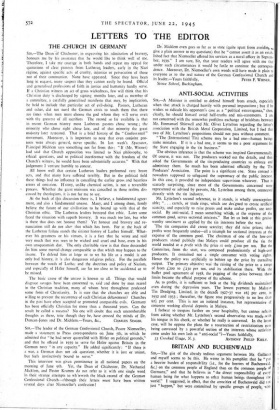ANTI-SOCIAL ACTIVITIES
SIR,—A Minister is entitled to .defend himself from attack, especially when that attack is charged heavily with personal imputations ; but if he wishes to ridicule his opponent's case as a " political extravaganza," then, clearly, he should himself avoid half-truths and mis-statements. I ant not concerned with the somewhat profitless exchange of brickbats between Mr. Emmanuel Shinwell and Mr. Oliver Lyttelton regarding the latt 's association with the British Metal Corporation, Limited, but I feel that two of Mr. Lyttelton's propositions should not pass without comment "The (International Tin) scheme may be a bad one—human beings make mistakes. If it is a bad one, it seems to me a poor argument the State engaging in the tin business."
The obvious inference is that the scheme was inspired Governmentally. Of course, it was not. The producers worked out the details, and then asked the Governments of the tin-producing countries to enforce and administer them. So much has been admitted officially by the Tin Producers' Association. The point is a significant one. State control is nowadays supposed to safeguard the supremacy of the public interest. In this case, it provided no independent supervision whatever. That is scarcely surprising, since most of the Governments concerned were represented or advised by persons, Mr. Lyttelton among them, connected directly with the tin industry.
Mr. Lyttelton's second reference, as it stands, is wholly unexception- able; " . . cartels, or trade rings, which are designed to create artificial scarcity, and especially to raise prices and make undue profits, are anti- social. By anti-social, I mean something which, at the expense of the common good, serves sectional interests." But let us look at this praise- worthy sentiment as applied by the tin interests before the war.
`The tin companies did create scarcity; they did raise prices; their profits were frequently undue—all a triumph for sectional interests at the expense of the common good. The chairman of one of the low-cost producers stated publicly that Malaya could produce all the tin the world needed at a profit with the price at only £too per ton. But the Committee, from the start, was composed predominantly of high-cost producers. It contained not a single consumer with voting rights. Hence the policy was artificially to bolster up the price by curtailing output. The primary objective was the raising of the price to a range of from £200 to £230 per ton, and its stabilisation there. With the buffer pool agreement of 1938, the pegging of the price between these limits became the official purpose of the scheme.
As to profits, it is sufficient to look at the big dividends maintained even during the depression years. The lowest payment by Malayan Tin Dredging, Limited, in the decade 1927-37 was 16-1 Per cent. in 1932 and 1933 ; thereafter, the figure rose progressively to no less than 921 per cent. This is not an isolated instance, but representative concerns working alluvial deposits in Malaya.
I forbear to trespass further on your hospitality, but cannot refrain from asking whether Mr. Lyttelton's second observation was made-with his tongue in his cheek, or whethei he really is converted. In the latt case, will he oppose the plans for a resurrection of restrictionism no being canvassed by a powerful section of the interests whose activiti come under his own lash as " anti-social "?—Yours faithfully,
Of


























 Previous page
Previous page